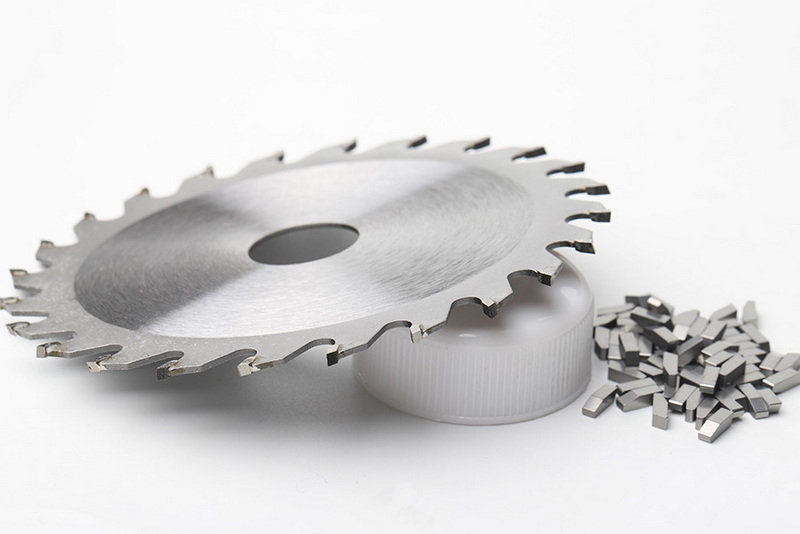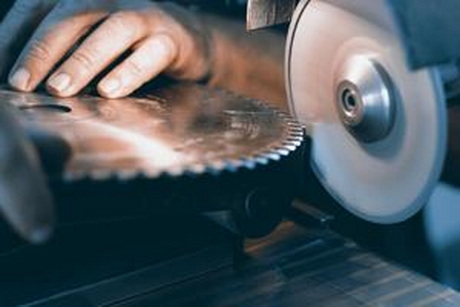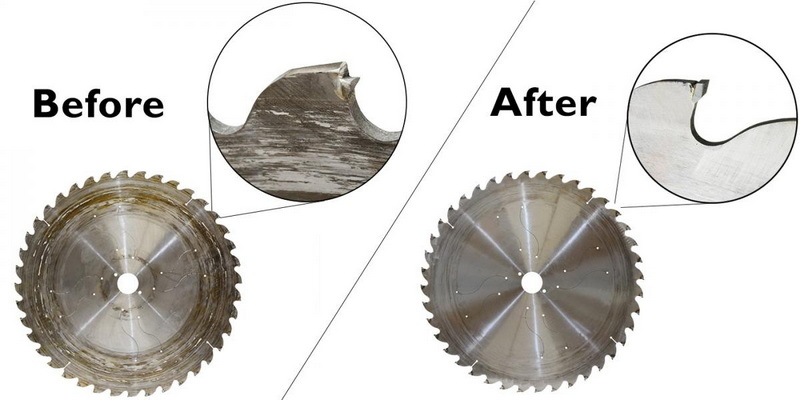Content Menu
● Introduction to Tungsten Carbide Blades
● Methods for Sharpening Tungsten Carbide Blades
>> 1. Diamond Grinding Wheels
>> 2. Silicon Carbide Grinding Wheels
>> 3. Electrical Discharge Machining (EDM)
>> 4. Laser Sharpening
● Common Mistakes to Avoid
● Advanced Techniques for Sharpening
>> CNC Grinding Machines
>> Ultrasonic Polishing
● Tools for Sharpening
>> AugerSharp® Knife & Tool Sharpener
>> Diamond Grit Honing Sticks
● Maintenance and Re-tipping
>> Re-tipping Process
● Conclusion
● FAQ
>> 1. What is the best method for sharpening tungsten carbide blades?
>> 2. How often should tungsten carbide blades be sharpened?
>> 3. What are the risks of overheating during sharpening?
>> 4. Can silicon carbide wheels be used for heavy-duty sharpening?
>> 5. What are the benefits of EDM in sharpening?
● Citations:
Tungsten carbide auger blades are renowned for their exceptional durability and hardness, making them ideal for demanding applications such as drilling through ice or hard materials. However, like all blades, they eventually lose their sharpness and require sharpening to maintain optimal performance. Sharpening tungsten carbide blades can be challenging due to their hardness, but with the right techniques and tools, it is achievable. This article will guide you through the process of sharpening tungsten carbide auger blades, highlighting the best methods and tools available.

Introduction to Tungsten Carbide Blades
Tungsten carbide blades are composed of tungsten carbide particles bonded together with a metallic binder, typically cobalt. This composition provides them with superior hardness and wear resistance compared to steel blades. However, their hardness also makes them more difficult to sharpen, requiring specialized tools and techniques.
Tungsten Carbide Blade Composition:
- Tungsten Carbide Particles: Provide hardness and wear resistance.
- Metallic Binder (Cobalt): Enhances toughness and helps bind carbide particles together.
Methods for Sharpening Tungsten Carbide Blades
Sharpening tungsten carbide blades requires materials that are harder than the blade itself. The most effective methods include using diamond grinding wheels, silicon carbide wheels, Electrical Discharge Machining (EDM), and laser sharpening.
1. Diamond Grinding Wheels
Diamond grinding wheels are the most effective tool for sharpening tungsten carbide blades due to their superior hardness. They provide high precision, are long-lasting, and allow for a fast sharpening process.
Benefits of Diamond Grinding Wheels:
- High Precision: Maintains the sharpness and angle of the blade's cutting edge.
- Long-Lasting: Extremely durable and can be used repeatedly without noticeable wear.
- Fast Process: Efficient and effective, restoring sharpness quickly.
How to Use Diamond Grinding Wheels:
1. Set the Blade Angle: Position the blade at the correct angle against the grinding wheel.
2. Use Coolant: Apply coolant to prevent overheating and maintain the blade's integrity.
3. Consistent Pressure: Apply consistent pressure while moving the blade over the grinding surface.
2. Silicon Carbide Grinding Wheels
Silicon carbide grinding wheels are a more affordable alternative to diamond wheels. They are less effective for heavy-duty sharpening but suitable for lighter or occasional use.
Benefits of Silicon Carbide Wheels:
- Affordable: More cost-effective than diamond wheels.
- Accessible: Widely available for lighter sharpening needs.
How to Use Silicon Carbide Wheels:
1. Position the Blade: Correctly position the blade against the wheel.
2. Apply Coolant: Keep the blade cool during grinding.
3. Consistent Pressure: Maintain even pressure for a sharp edge.
3. Electrical Discharge Machining (EDM)
EDM is an advanced technique that uses electrical discharges to erode material from the blade's surface. It is ideal for blades requiring intricate geometries or tight tolerances.
Benefits of EDM:
- High Precision: Extremely fine sharpening without mechanical stress.
- No Mechanical Stress: Reduces the risk of deformation or damage.
How to Use EDM:
1. Setup EDM Machine: Place the blade in the EDM machine.
2. Apply Electrical Discharges: Precisely erode material from the blade's edge.
4. Laser Sharpening
Laser sharpening uses focused laser beams to sharpen blades without physical contact, eliminating mechanical wear.
Benefits of Laser Sharpening:
- Extreme Precision: Restores blades to their original sharpness with high accuracy.
- No Physical Wear: No risk of physical wear or damage.
- Quick Process: Faster than traditional grinding methods.
How to Use Laser Sharpening:
1. Advanced Machinery: Requires specialized laser sharpening equipment.
2. Direct Laser Beam: Vaporize small amounts of material to restore sharpness without applying any physical force.

Common Mistakes to Avoid
When sharpening tungsten carbide blades, several common mistakes should be avoided to ensure effective sharpening and prevent damage:
- Overheating the Blade: Use coolant to prevent microfractures or breakage.
- Inappropriate Abrasives: Only use materials harder than tungsten carbide, such as diamond or silicon carbide.
- Incorrect Sharpening Angle: Use a guide to maintain the correct angle for optimal performance.
- Neglecting Regular Maintenance: Regular sharpening extends blade lifespan and efficiency.
Advanced Techniques for Sharpening
In addition to the basic methods, there are advanced techniques that can enhance the sharpening process:
CNC Grinding Machines
CNC grinding machines provide automated precision grinding, ensuring consistent results across multiple sharpenings. They are particularly useful for high-volume applications where uniformity is critical.
Benefits of CNC Grinding:
- Consistency: Ensures uniform sharpening across all blades.
- Efficiency: Reduces labor time and increases productivity.
- Precision: Maintains original angles and geometry.
Ultrasonic Polishing
Ultrasonic polishing uses ultrasonic waves combined with abrasives to polish and sharpen edges without significant material removal. This method maintains the original geometry while enhancing sharpness.
Benefits of Ultrasonic Polishing:
- Precision: Enhances edge sharpness without altering the blade's geometry.
- Material Preservation: Minimizes material removal, extending blade life.
Tools for Sharpening
Several tools are available to assist in sharpening tungsten carbide blades:
AugerSharp® Knife & Tool Sharpener
The AugerSharp® is designed specifically for sharpening auger blades, featuring a reversible diamond-honed tungsten carbide blade. It provides a convenient and portable solution for maintaining sharp edges in the field.
Benefits of AugerSharp®:
- Convenience: Portable and easy to use.
- Effectiveness: Maintains razor-sharp edges on auger blades.
Diamond Grit Honing Sticks
Diamond grit honing sticks can be used for fine-tuning the edge of carbide blades. They are particularly useful for hand-sharpening small areas or maintaining sharpness between major sharpening sessions.
Benefits of Diamond Grit Honing Sticks:
- Precision: Allows for precise control over sharpening angles.
- Portability: Easy to carry and use in various settings.
Maintenance and Re-tipping
Regular maintenance is crucial for extending the life of tungsten carbide blades. However, after multiple sharpenings, the blades may require re-tipping to replace worn-out carbide teeth.
Re-tipping Process
Re-tipping involves removing old teeth, cleaning the blade, and re-gulleting before attaching new tungsten carbide tips. This process ensures that the blade performs as new, maintaining its cutting efficiency.
Benefits of Re-tipping:
- Performance Restoration: Returns the blade to its original cutting performance.
- Cost-Effectiveness: Extends the life of the blade, reducing the need for frequent replacements.
Conclusion
Sharpening tungsten carbide auger blades requires careful consideration of the tools and techniques used. Diamond grinding wheels offer the best results due to their hardness and precision, while silicon carbide wheels provide a cost-effective alternative for lighter use. EDM and laser sharpening are ideal for high-precision applications. By avoiding common mistakes and maintaining regular sharpening schedules, you can significantly extend the life of your blades and ensure optimal performance.

FAQ
1. What is the best method for sharpening tungsten carbide blades?
The best method for sharpening tungsten carbide blades is using diamond grinding wheels due to their superior hardness and precision.
2. How often should tungsten carbide blades be sharpened?
Tungsten carbide blades should be sharpened regularly to maintain optimal performance. The frequency depends on usage, but sharpening before the blade becomes completely dull is recommended.
3. What are the risks of overheating during sharpening?
Overheating can cause microfractures or breakage of the tungsten carbide blade. Using a coolant is essential to prevent this.
4. Can silicon carbide wheels be used for heavy-duty sharpening?
Silicon carbide wheels are less effective for heavy-duty sharpening compared to diamond wheels. They are better suited for lighter or occasional use.
5. What are the benefits of EDM in sharpening?
EDM offers high precision sharpening without applying mechanical stress, making it ideal for blades with intricate geometries or tight tolerances.
Citations:
[1] https://passionblade.com/what-is-the-best-way-to-sharpen-tungsten-carbide-blade/
[2] https://ibuildit.ca/tips/hand-sharpen-a-carbide-saw-blade/
[3] https://accusharp.com/product/007/
[4] https://benchmarkabrasives.com/blogs/news/how-to-sharpen-an-auger-drill-bit-using-auger-bit-file
[5] https://www.bendigosaw.com.au/page/33/re-tipping-sawblades
[6] https://www.zhongbocarbide.com/can-you-sharpen-tungsten-carbide.html
[7] https://www.exchangeablade.com/blog/story/24/How-Can-I-Sharpen-My-Carbide-Saw-Blade/
[8] https://tungstenandtool.com/blogs/news/industrial-cutting-tool-sharpening-4-common-questions-answered
[9] https://www.youtube.com/watch?v=ikCBVvZ7ZcA
[10] https://www.bladeforums.com/threads/tungsten-carbide-sharpening.1867146/
[11] https://www.reddit.com/r/chefknives/comments/9kxss2/tungsten_carbide_sharpeners/
[12] https://coronatools.com/products/ac-8300
[13] https://knife.wickededgeusa.com/forums/topic/any-tips-on-sharpening-a-sandrin-tungsten-carbide-blade/
[14] https://www.4x4community.co.za/forum/showthread.php/335502-Sharpening-a-tungsten-tipped-saw-blade
[15] https://www.ebay.co.uk/itm/235014814185
[16] https://www.youtube.com/watch?v=mJhJTpD67Iw
[17] https://forums.ybw.com/threads/sharpening-tungsten-carbide-chisels-and-scraper-blades.471030/page-2
[18] https://weldmongerstore.com/blogs/news/tungsten-sharpening-cutting
[19] https://forums.ybw.com/threads/sharpening-tungsten-carbide-chisels-and-scraper-blades.471030/
[20] https://bigfishtackle.com/forum/showthread.php?tid=300224
[21] https://www.reddit.com/r/sharpening/comments/i5fo2b/hi_ive_got_a_tiny_tungsten_blade_that_is/
[22] https://en.yongtaisaw.com/News_details/24.html
[23] https://www.youtube.com/watch?v=KdT7Aroul0E
[24] https://accusharp.com/faqs/
[25] https://www.carbide.com/sawshop/service-FAQ.cfm
[26] https://www.reddit.com/r/sharpening/comments/135cacg/help_with_sharpening_a_sandrin_torino_polyhedral/
[27] https://www.retopz.com/57-frequently-asked-questions-faqs-about-tungsten-carbide/
[28] https://www.ukocarbide.com/blog/sharpening-and-maintaining-circular-saw-blades-correctly/
[29] https://www.lakesimcoeoutdoors.com/forums/index.php?showtopic=16221
[30] https://usa.sandrinknives.com/faq/
[31] https://www.arboristsite.com/threads/carbide-teeth-grinding-questions.193748/
[32] https://www.zgcccarbide.com/news/Understanding-Tungsten-Carbide-Blades:-A-Comprehensive-Guide-182.html
[33] https://resources.arcmachines.com/how-advanced-methods-for-sharpening-tungsten-electrodes-helps-prevent-inclusions-ami/
[34] https://accusharp.com/product/003/
[35] https://cuchillascastillo.com/en/tungsten-carbide-blades-precision-and-durability-in-industrial-cutting/
[36] https://www.youtube.com/watch?v=CLC9lzOF7bI
[37] https://www.reddit.com/r/sharpening/comments/1g6gq3h/how_to_sharpen_tungsten_carbide_cutting_tools/
[38] https://www.youtube.com/watch?v=UWrMPQn5zI8
















